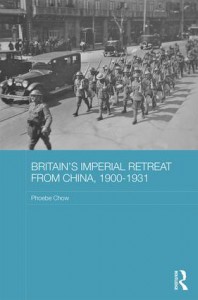Detaching from empire

In the century that followed the Opium War Britain exerted a predominant influence in many areas of China. Their merchants sold goods irrespective of governmental objections, their missionaries enjoyed a privileged status to carry out their work, and their officials collected customs duties to fill British coffers rather than those of the Chinese. Much of this began to change in the 1920s, as anti-imperial riots and strikes prompted the beginning of a gradual reduction in Britain's imperial presence in the country.
As Phoebe Chow argues, however, to begin the story of Britain's imperial "retreat" in the 1920s misses a good deal of the process. Her book, which offers an examination of British attitudes towards China in the early twentieth century and their influence on policy, offers a strong argument for dating the beginnings of this withdrawal earlier, to the start of the twentieth century. Though Britain began it having just participated in the successful suppression of the Boxer Uprising, as she notes there were already arguments in favor of reducing a baleful influence on China. One early reflection of this was the campaign against selling opium to China, one which led to the phasing out of the trade in 1907. These arguments gained greater momentum in the aftermath of the First World War, when Britain's weakened economic position led to calls to reassess their presence in China. The May Thirtieth Movement thus served as confirmation for these skeptics, helping to push the British government to a disengagement that was well underway by the end of the 1920s.
By intertwining popular attitudes with policy formation, Chow provides readers with an interesting look at Anglo-Chinese relations at a pivotal point in both countries' histories. Yet her thesis leads her to focus more on the advocates of retreat rather than on the defenders of Britain's position in China, which imbalances her coverage of the debate; moreover, the degree of coverage of the other side of the relationship -- the Chinese and their perspective on the British presence -- lacks anywhere near the level of detail Chow brings to her analysis of the British, This latter deficiency, however, is perhaps understandable given the differences in archival resources, and doesn't diminish the value of Chow's book as a study of the British declension from their empire in Asia.
 2
2






